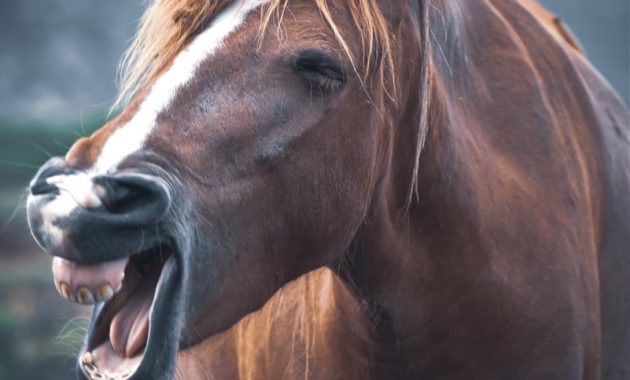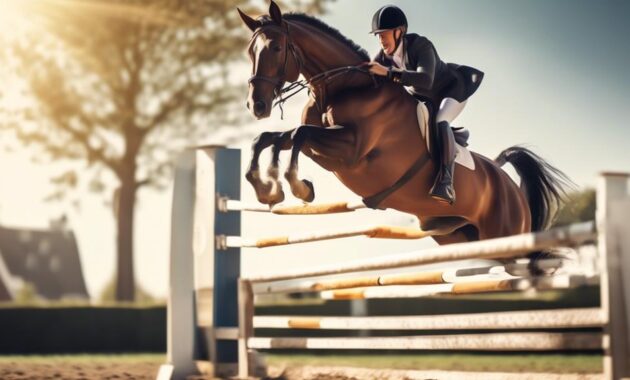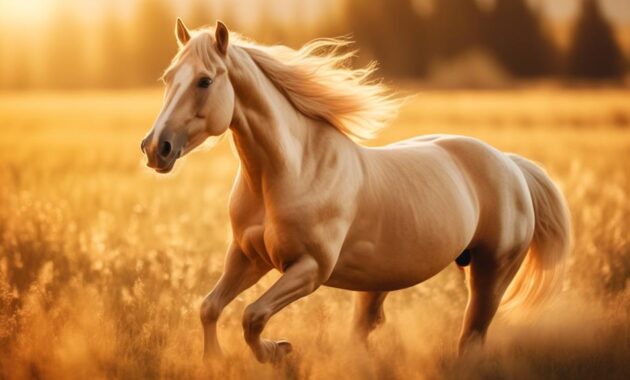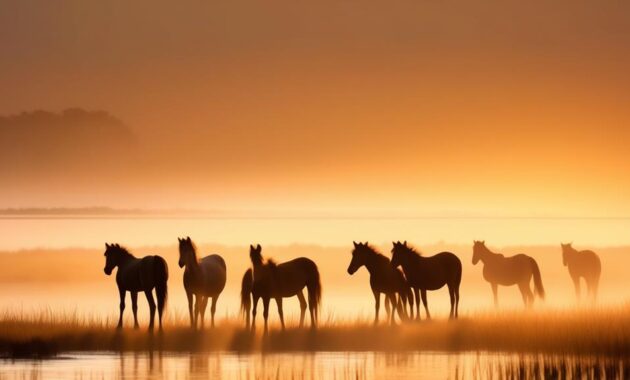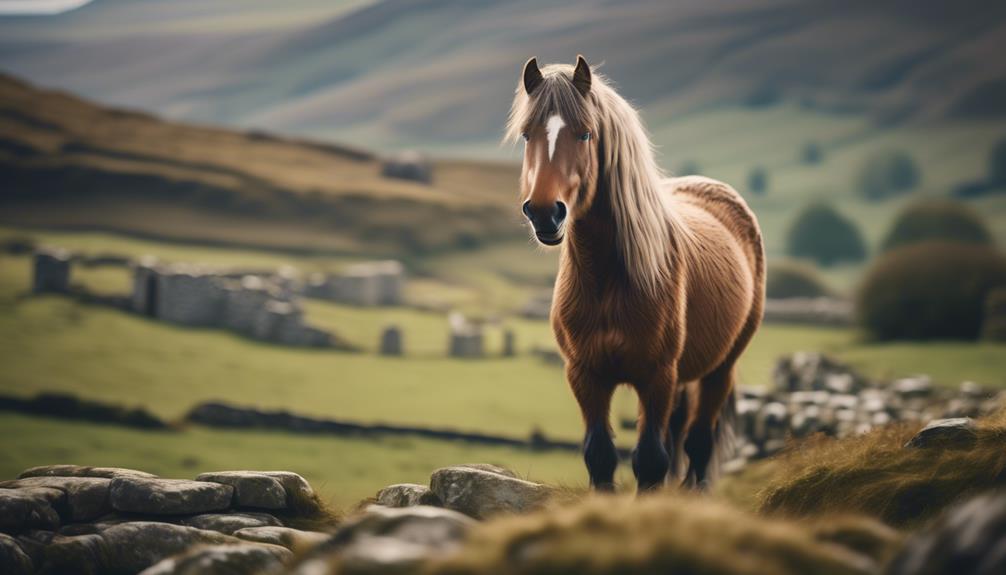
Are you skeptical about the versatility of Dales Ponies? Think again. These rare and endangered gems of Northern England have proven themselves time and time again with their strength, intelligence, and surefootedness.
While you may assume that such a small breed wouldn't be up to the task, Dales Ponies have a rich history rooted in the lead industry, where they served as pack ponies. Their adaptability and kind temperament make them the perfect fit for any horse owner, trainer, or rider.
But that's just the beginning. There's so much more to discover about the distinctive appearance, grooming tips, and the endangered status of these remarkable creatures.
So, are you ready to uncover the beauty, history, and significance of the Dales Ponies?
Key Takeaways
- Dales Ponies are a small but extremely strong breed, well-suited for all levels of horse owners, trainers, and riders.
- Native to Northern Yorkshire in England, Dales Ponies were originally bred for the lead industry and later used for various agricultural purposes.
- Despite almost going extinct during World War II, breeders worked to increase their numbers, and Dales Ponies are now considered endangered.
- Dales Ponies are known for their versatility, surefootedness, and distinctive appearance, with common colors including brown, gray, roan, bay, and black.
Characteristics of Dales Ponies
The Dales Ponies, known for their small yet powerful physique, have a range of distinct characteristics that make them a sought-after equine companion. Weighing around 1,000 pounds, these ponies are incredibly strong for their size. With a lifespan of 25-30 years, they're reliable and long-lasting partners for all levels of horse owners, trainers, and riders.
In terms of temperament, Dales Ponies are active, courageous, kind, bold, quiet, versatile, calm, sensible, and intelligent. Their versatility and surefootedness make them well-suited for various tasks, from plowing and cart pulling to herding sheep.
Native to the upper dales in Northern Yorkshire, these ponies almost went extinct during World War II, but dedicated breeders worked hard to increase their numbers. Today, they're considered an endangered breed, valued for their unique characteristics and strong work ethic.
History and Heritage of Dales Ponies
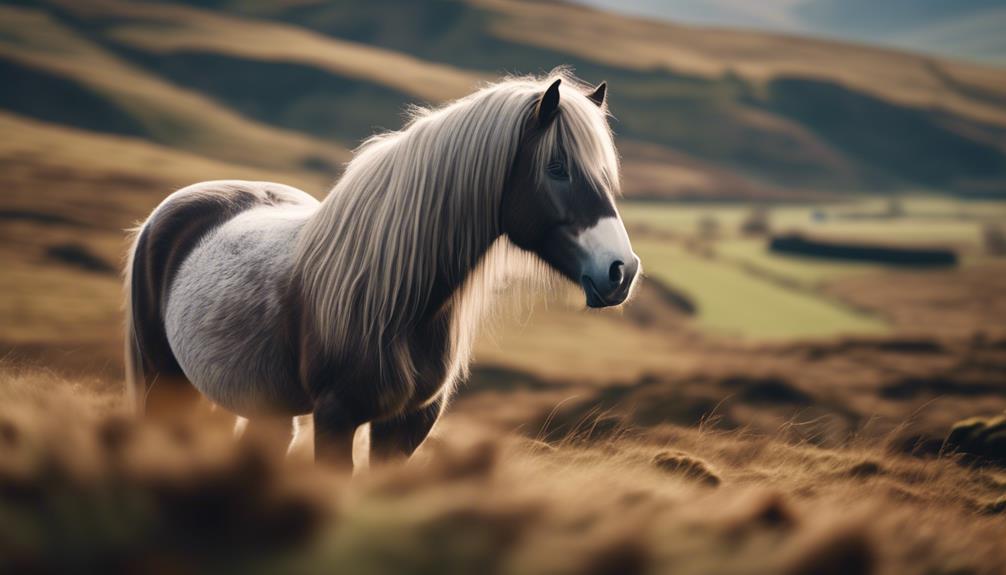
With a rich history rooted in the upper dales of Northern Yorkshire, Dales Ponies have a heritage that spans centuries. These resilient ponies were initially bred for the lead industry in Pennine and played a crucial role as pack ponies. They were also used on small farms for plowing, cart pulling, and herding sheep.
During World War II, the breed faced near extinction, but dedicated breeders worked tirelessly to increase their numbers. Today, Dales Ponies are considered endangered, but they're cherished for their versatility and surefootedness. Their ability to adapt to various tasks and terrain has made them valuable companions for horse owners, trainers, and riders of all levels.
The history and heritage of Dales Ponies exemplify their importance in Northern England's cultural and agricultural traditions.
Distinctive Appearance of Dales Ponies
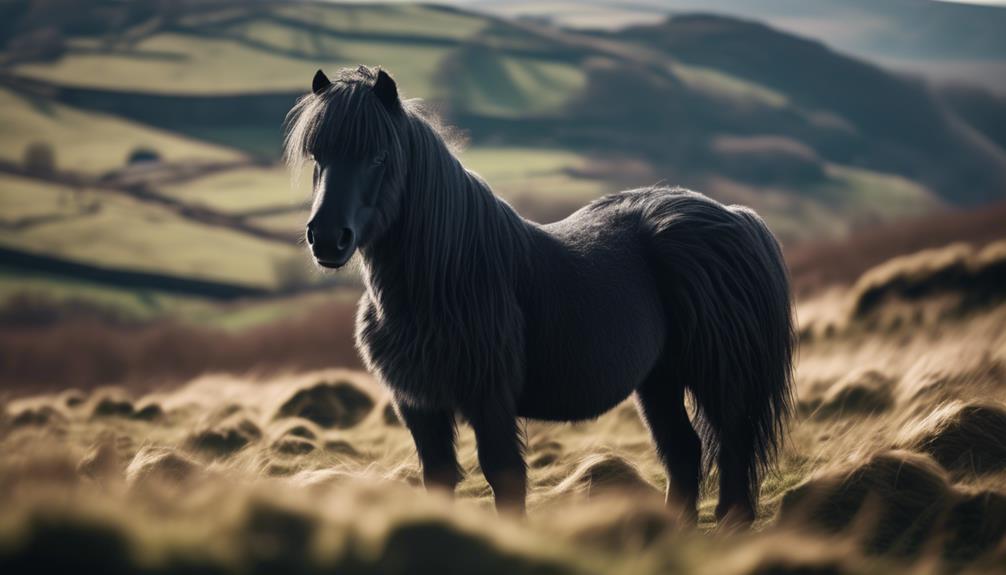
Dales Ponies boast a striking and unique appearance that sets them apart from other equines. With their pony-like head, neat and tiny ears, and broadness between the eyes, they've a distinct look. Their necks are ample in length and strong, while their bodies feature well-sprung ribs, a deep chest, and long shoulders with well-developed muscles.
The hindquarters of Dales Ponies are powerful, deep, and lengthy, giving them a robust and sturdy appearance. Their tails aren't set high and are characterized by straight, long hair that can reach the ground. Dales Ponies come in various colors, including brown, gray, roan, bay, and black, with black being the most common.
They also have long, straight, and flowing manes and tails, adding to their distinctive appearance.
Colors and Markings of Dales Ponies
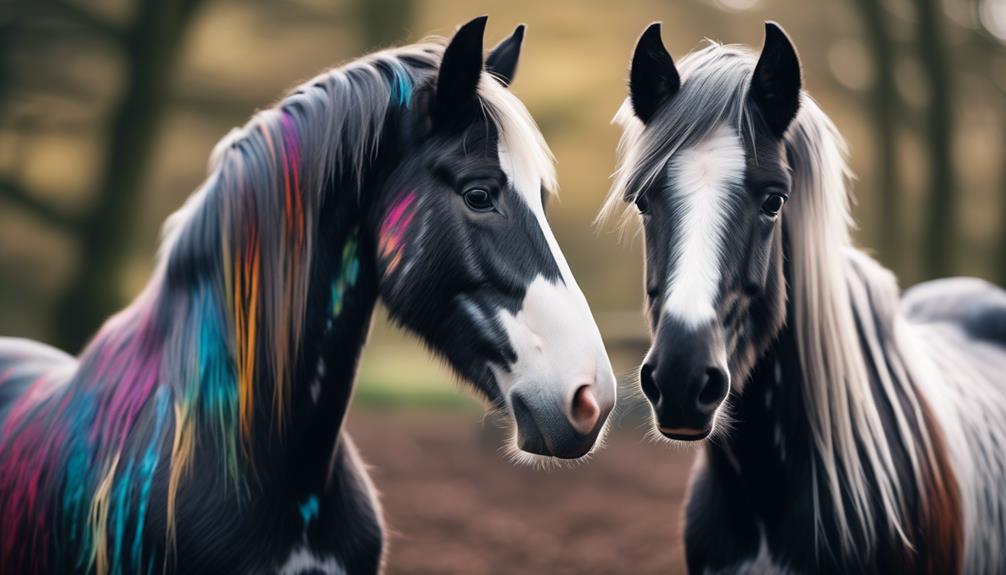
One of the distinguishing features of Dales Ponies is their range of colors and markings. These versatile gems of Northern England come in a variety of hues, including brown, gray, roan, bay, and black. However, black is the most common color found among Dales Ponies.
In addition to their diverse colors, these ponies may also display white markings on their heads, such as a star or snip, as well as on their hind legs, known as fetlocks.
Another notable characteristic of Dales Ponies is their long, straight, and flowing manes and tails. Whether they're solid-colored or adorned with unique markings, Dales Ponies are truly captivating and beautiful creatures.
Grooming Tips for Dales Ponies
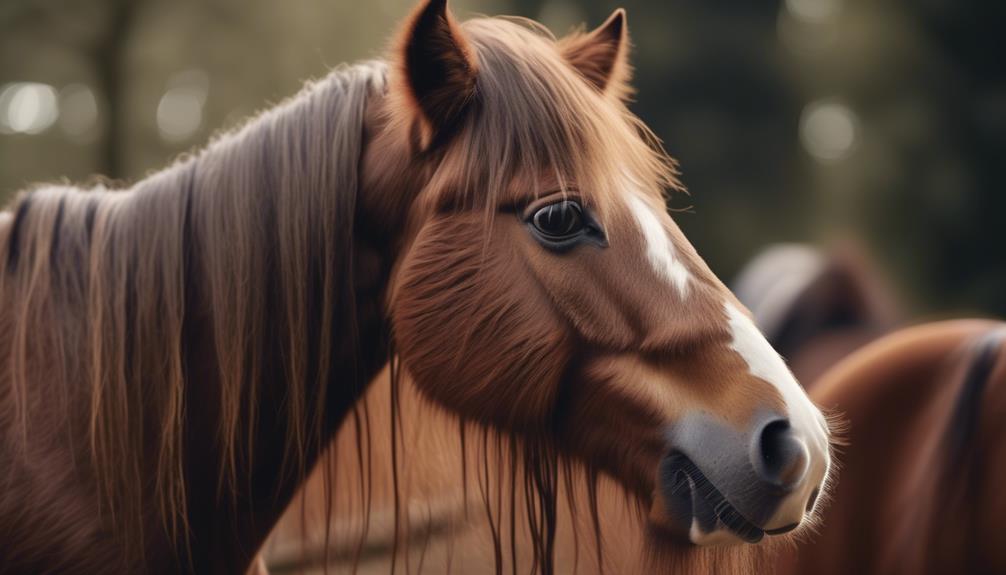
Regular grooming is essential for maintaining the health and appearance of your Dales Pony. As a Dales Pony owner, it's important to establish a grooming routine to keep your pony looking its best.
Start by using a curry comb to remove any dirt and loose hair from your pony's coat. Next, use a dandy brush to further remove dirt and debris, followed by a shedding blade to remove any remaining loose hair.
Pay extra attention to your pony's mane and tail, using equine shampoo and appropriate brushes to keep them clean and tangle-free. Additionally, regularly check your pony's hooves and surrounding hair for any injuries or infections.
The Endangered Status of Dales Ponies
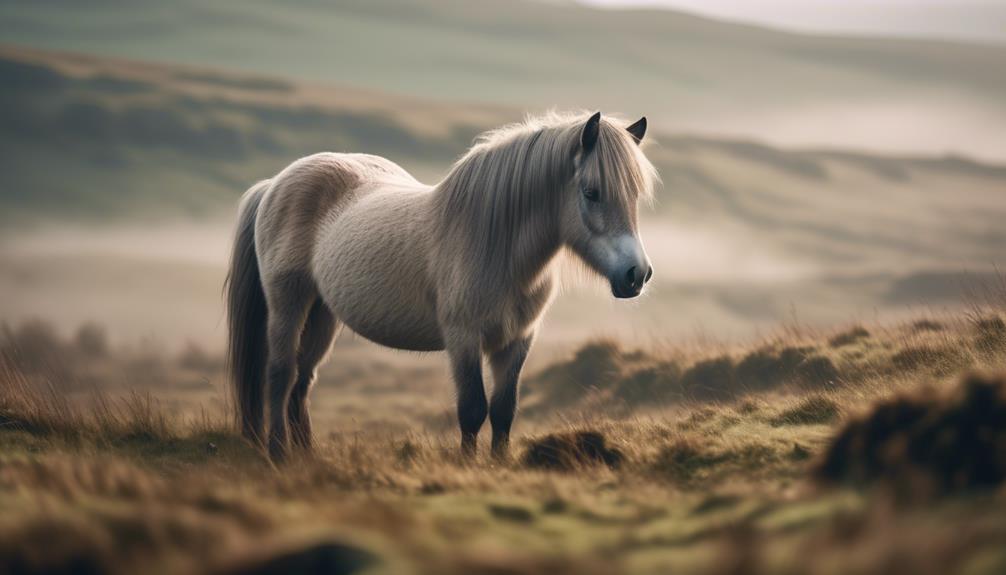
As a responsible owner, it's important to understand the current status of Dales Ponies, especially considering their historical significance and grooming needs.
The Dales Pony, native to the upper dales in Northern Yorkshire, is now considered an endangered breed. Once used for the lead industry and as pack ponies, they played a vital role in the region's economy. However, during World War II, their numbers dwindled dangerously close to extinction.
Thanks to the efforts of dedicated breeders, their population has increased, but they still face significant challenges. Conservation organizations are working tirelessly to protect and preserve these versatile gems of Northern England.
Frequently Asked Questions
How Much Exercise Do Dales Ponies Require on a Daily Basis?
Dales ponies require regular exercise on a daily basis to stay healthy and happy. It's important to provide them with opportunities to stretch their legs, whether it's through riding, driving, or simply allowing them to graze and roam.
What Are Some Common Health Issues That Dales Ponies May Face?
Dales ponies may face common health issues like laminitis, obesity, and dental problems. Regular veterinary check-ups, proper diet, exercise, and dental care are essential to keep your pony healthy and ensure their well-being.
Are Dales Ponies Suitable for Beginner Riders?
Yes, Dales ponies are suitable for beginner riders. They are reliable, hardworking companions that are kind, calm, and versatile. Their small, strong physique and intelligent temperament make them a great choice for all levels of horse owners, trainers, and riders.
Can Dales Ponies Be Trained for Jumping or Dressage?
Yes, Dales ponies can be trained for jumping or dressage. Their versatile and intelligent nature, combined with their strength and surefootedness, make them suitable for various disciplines.
What Type of Diet Is Recommended for Dales Ponies to Maintain Their Health and Energy Levels?
To maintain the health and energy levels of Dales ponies, a diet rich in high-quality forage, such as hay or pasture, along with a balanced concentrate feed, is recommended. Consult with a veterinarian or equine nutritionist for specific dietary requirements.
What Are the Similarities and Differences Between Dales Ponies and Fell Ponies?
Dales Ponies and Fell Ponies are both native to England and share a similar ancestry as England’s Viking workhorses. Both breeds are known for their intelligence, strength, and adaptability to the harsh terrain of the northern English countryside. However, Dales Ponies are typically larger and sturdier, while Fell Ponies are smaller and more agile.
Conclusion
In conclusion, the endangered Dales Ponies of Northern England are truly versatile gems. Their strength, intelligence, and surefootedness make them exceptional equine companions.
With a rich history rooted in the upper dales of Yorkshire, these remarkable creatures were originally bred for the lead industry and served as pack ponies. Despite facing near-extinction, dedicated breeders have ensured their survival.
Whether you need a reliable plow horse, a dependable cart puller, or a steadfast herding companion, the Dales Pony is the perfect fit for all levels of horse owners, trainers, and riders.

